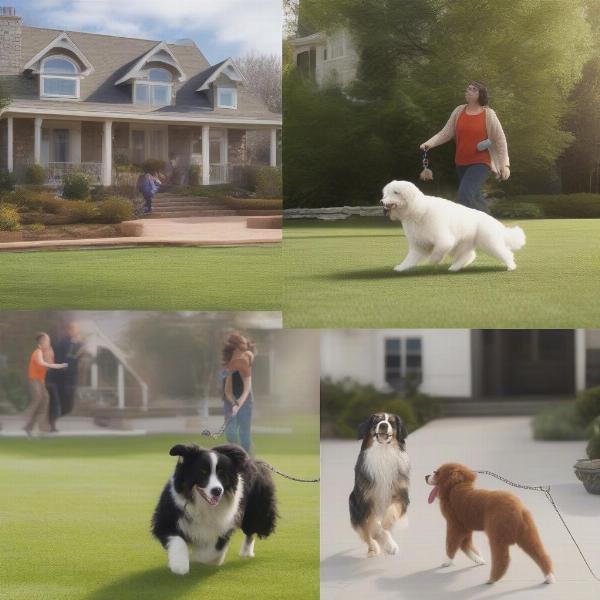Choosing a large breed dog is a big decision, and longevity is often a key factor. While big dogs are known for their loving personalities and imposing presence, they sometimes have shorter lifespans than smaller breeds. But don’t worry, there are plenty of longest lived big dogs out there ready to become your devoted companion for many years to come. This article will explore some of these breeds, discussing their temperaments, health considerations, and what makes them great additions to your family.
Choosing a big dog that will be a part of your life for years to come involves considering several factors beyond just size. Temperament, exercise needs, and potential health issues are all crucial. This guide aims to help you find the perfect gentle giant to share your life with, focusing on breeds known for their longer lifespans. We’ll explore everything from the laid-back Bernese Mountain Dog to the energetic Australian Shepherd, ensuring you have the information you need to make the best choice for your lifestyle and family.
Discovering Long-Lived Large Breeds
What exactly constitutes a “big” dog? Generally, breeds weighing over 50 pounds are considered large. While many large breeds have shorter lifespans, some defy this trend. Let’s delve into some of these longest lived big dogs:
- Australian Shepherd: While medium-sized, they’re on the larger end of the spectrum and known for their intelligence and energy. They typically live 12-15 years.
- Bernese Mountain Dog: These gentle giants are loyal and affectionate, with a lifespan of 7-10 years. While on the lower end of the longevity spectrum for this list, they still offer a significant companionship period for a large breed.
- Standard Poodle: Elegant and hypoallergenic, Standard Poodles are highly intelligent and live for 12-15 years.
- Siberian Husky: These striking dogs are known for their endurance and love of the outdoors. Their lifespan ranges from 12-14 years.
Health and Care for Your Gentle Giant
Larger dogs may be prone to certain health issues, such as hip dysplasia and bloat. Regular vet checkups, a healthy diet, and appropriate exercise are vital for maintaining their well-being.
- Nutrition: Feeding your large breed dog a balanced diet designed for their size and age is crucial.
- Exercise: Providing adequate exercise, tailored to the breed’s energy levels, prevents boredom and helps maintain a healthy weight.
- Grooming: Regular grooming is essential, especially for breeds with long coats.
Is a Long-Lived Big Dog Right for You?
Consider your lifestyle and living situation. Large breeds require space and commitment. Do you have a yard? Are you prepared for the responsibilities of owning a big dog?
- Space: Large dogs need ample room to move and play.
- Time: Are you prepared to dedicate time for training, exercise, and grooming?
- Financial Commitment: Larger dogs often have higher costs associated with food, vet care, and supplies.
 Lifestyle and Big Dogs
Lifestyle and Big Dogs
Conclusion: Welcoming a Long-Lived Big Dog into Your Life
Choosing a longest lived big dog is a rewarding experience. By understanding the specific needs and characteristics of different breeds, you can find a loving companion who will enrich your life for many years. Remember to consider your lifestyle and resources before making this commitment.
FAQ
- What are the longest lived large dog breeds? Several large and medium-large breeds known for longer lifespans include Australian Shepherds, Standard Poodles, Siberian Huskies, and Bernese Mountain Dogs.
- What health problems are common in large dogs? Hip dysplasia, bloat, and certain types of cancers are more prevalent in larger breeds.
- How much exercise does a large dog need? Exercise needs vary by breed, but most large dogs benefit from daily walks, playtime, and mental stimulation.
- What is the best food for a large breed dog? Consult your veterinarian to determine the best diet for your dog’s specific age, breed, and activity level.
- How can I find a reputable breeder? Research breeders carefully, ask for references, and visit their facilities to ensure the health and well-being of the dogs.
- Is it more expensive to own a large dog? Yes, generally, larger dogs require more food, larger supplies, and potentially higher vet bills.
- Are large dogs good with children? Many large breeds are gentle and loving with children, but proper socialization and supervision are always crucial.
ILM Dog is your trusted resource for expert advice on dog breeds, health, training, nutrition, and more. We are passionate about helping you provide the best possible care for your canine companion. Whether you’re a seasoned dog owner or just starting your journey, we offer valuable insights and resources to support you every step of the way. From breed selection to senior dog care, ILM Dog provides the information you need to make informed decisions. Contact us for personalized guidance and support: Email: [email protected], Phone: +44 20-3965-8624. Visit ILM Dog today to learn more!